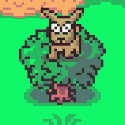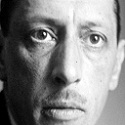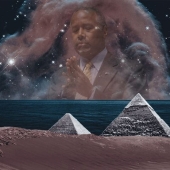- dogcrash truther
- Nov 2, 2013
-

|
I'm reading this book right now, is anyone else reading this book? I'd like to talk about this book. Here's a synopsis, from Amazon dot com
quote:A biting satire about a young man's isolated upbringing and the race trial that sends him to the Supreme Court, Paul Beatty's The Sellout showcases a comic genius at the top of his game. It challenges the sacred tenets of the United States Constitution, urban life, the civil rights movement, the father-son relationship, and the holy grail of racial equality--the black Chinese restaurant.
Born in the "agrarian ghetto" of Dickens--on the southern outskirts of Los Angeles--the narrator of The Sellout resigns himself to the fate of lower-middle-class Californians: "I'd die in the same bedroom I'd grown up in, looking up at the cracks in the stucco ceiling that've been there since '68 quake." Raised by a single father, a controversial sociologist, he spent his childhood as the subject in racially charged psychological studies. He is led to believe that his father's pioneering work will result in a memoir that will solve his family's financial woes. But when his father is killed in a police shoot-out, he realizes there never was a memoir. All that's left is the bill for a drive-thru funeral.
Fuelled by this deceit and the general disrepair of his hometown, the narrator sets out to right another wrong: Dickens has literally been removed from the map to save California from further embarrassment. Enlisting the help of the town's most famous resident--the last surviving Little Rascal, Hominy Jenkins--he initiates the most outrageous action conceivable: reinstating slavery and segregating the local high school, which lands him in the Supreme Court.
And here's a excerpt of a part I thought was interesting. I typed this out so sorry if there any mistakes:
quote:
Then there was the time he wanted to test "Servility and Obedience in the Hip-Hop Generation." I must've been about ten when my father sat me down in front of a mirror, pulled a Ronald Reagan Halloween mask over his head, pinned a defunct pair of Trans World Airlines captain wings to his lab coat, and proclaimed himself a "white authority figure." "The friend of the family in the mirror is a stupid friend of the family," he explained to me in that screechy, cloying "white voice" comedians of color use, while attaching a set of electrodes to my temples. The wires led to a sinister-looking console filled with buttons, dials, and old-fashioned voltage gauges.
"You will ask the boy in the mirror a series of questions about his supposed friend of the family history from the sheet on the table. If he gets the question wrong or fails to answer in ten seconds, you will press the red button, delivering an electric shock that will increase in intensity with each wrong answer."
I knew better than to beg for mercy, for mercy would be rant about getting what I deserved for reading the one comic book I ever owned. Batman #203, Spectacular Secrets of the Batcave Revealed, a moldy, dog-eared back issue someone had thrown into the farmyard and I brought inside and nursed back to readability like a wounded piece of literature. It was the first thing I had ever read from the outside world, and when I whipped it out during a break in my homeschooling, my father confiscated it. From then on, whenever I didn't know something or had a bad day in the neighborhood, he'd wave the comic's half-torn cover in my face. "See, if you weren't wasting your life reading this bullshit, you'd realize Batman ain't coming to save your rear end or your people!"
I read the first question.
"Prior to declaring independence in 1957, the West African nation of Ghana was comprised of what two colonies?"
I didn't know the answer. I cocked my ears for the roar of the rocket-propelled Batmobile screeching around the corner, but could only hear my father's stopwatch ticking down the seconds. I gritted my teeth, placed my finger over the red button, and waited for the time to expire.
"The answer is Togoland and the Gold Coast."
Obediently, as my father predicted, I pressed the button. The needles on the dial and my spine both straightened, while I watched myself in the mirror jitterbug violently for a second or two.
Jesus.
"How many volts was that?" I asked, my hands shaking uncontrollably.
"The subject will ask only the questions that are listed on the sheet," my dad said coldly, reaching past me to turn a black dial a few clicks to the right, so the indicator now rested on XXX. "Now, please read the next question."
I began to suffer from a blurring of vision I suspected was psychosomatic, but nonetheless, everything was as out of focus as a five-dollar bootleg video on a swap-meet flat screen, and to read the next question I had to hold the quivering paper to my nose.
"Of the 23,000 eight-grade students who took the entrance exam for admission into Stuyvesant High, New York's most elite public high school, how many African-Americans scored high enough to qualify for admission?"
When I finished reading, my nose began to bleed, red droplets of blood trickling from my left nostril and plopping down onto the table in perfect one-second intervals. Eschewing his stopwatch, my father started the countdown. I glanced suspiciously at him. The question was too topical. Obviously he'd been reading The New York Times at breakfast. Prepping for the day's experiment by looking for racial fodder over a bowl of Rice Krispies. Flipping from page to page with a speed and rage that caused the paper's sharp corners to snap, crackle, and pop in the morning air.
What would Batman do if he rushed into the kitchen right then and saw a father electrocuting his son for the good of science? Why, he'd open up his utility belt and bust out some of those tear-gas pellets, and while my dad was choking on the fumes, he'd finish asphyxiating him, assuming there was enough bat rope to tie around his fat-rear end hot-dog neck; then he'd burn out his eyeballs with a laser torch, use the miniature camera to take some pictures of bat-posterity, then steal Pop's classic, only-driven-on-trips-to-white-neighborhoods sky-blue Karman Ghia convertible with the skeleton keys, and we'd bone the gently caress out. That's what Batman would've done. But me, cowardly batfag that I was and still am, I could only think to question the question's shoddy methodology. For instance, how many black students had taken the admissions test? What was the average class size at Stuyvesant High?
But this time, before the tenth drop of blood had landed on the table, and before my father could blurt out the answer (seven), I pressed the red button, self-administering a nerve-shattering, growth-stunting electric shock of voltage that would have frightened Thor and lobotomized an already sedated educated class, because now I, too, was curious. I wanted to see what happens when you bequeath a ten-year-old black boy to science.
What I discovered was that the phrase "evacuate one's bowels" is a misnomer, because the opposite was true, my bowels evacuated me. It was a feces retreat comparable to the great evacuations of history. Dunkirk. Saigon. New Orleans. But unlike the Brits, the Vietnamese capitalists, and flooded-out residents of the Ninth Ward, the occupants of my intestinal tract had nowhere to go. What runner parts of that fetid tidal wave of poo poo and urine that didn't encamp itself about my buttocks and balls ran down my legs and pooled in and around my sneakers. Not wanting to hinder the integrity of his experiment, my father simply pinched his nose shut and motioned to me to proceed. Thank goodness, I knew the answer to the third question, "How many Chambers are in the Wu-Tang," because if I hadn't, my brain would be the ash-gray color and consistency of a barbecue briquette on the Fifth of July.
|
 #
?
Mar 20, 2015 02:04
#
?
Mar 20, 2015 02:04
|
|
- Adbot
-
ADBOT LOVES YOU
|

|
|
#
?
May 3, 2024 23:22
|
|
- Stravinsky
- May 31, 2011
-

|
I'm going to get it a read it for the book published this year challenge and will bump this thread when I actually start it.
|
 #
?
Mar 20, 2015 17:51
#
?
Mar 20, 2015 17:51
|
|
- Mel Mudkiper
- Jan 19, 2012
-

At this point, Mudman abruptly ends the conversation. He usually insists on the last word.
|
I'm reading this book right now, is anyone else reading this book? I'd like to talk about this book. Here's a synopsis, from Amazon dot com
And here's a excerpt of a part I thought was interesting. I typed this out so sorry if there any mistakes
I am curious about it honestly. I keep eyeing it on my nook and trying to decide whether to buy it. My big concern is that it seems like it might end up being more goofy than insightful. How are you enjoying it?
|
 #
?
Mar 20, 2015 17:53
#
?
Mar 20, 2015 17:53
|
|
- dogcrash truther
- Nov 2, 2013
-

|
I am curious about it honestly. I keep eyeing it on my nook and trying to decide whether to buy it. My big concern is that it seems like it might end up being more goofy than insightful. How are you enjoying it?
I'm enjoying it, but your concern is justified, I think. The major criticism I have is that there are sentences and paragraphs that are constructed just for the punchline, not because the joke has anything to do with the target of the satire. There are a lot of comfortable jokes along with uncomfortable ones and I wish he'd go for the jugular and stay more focused than he does. That said, it's not just goofy, there's genuine insight and righteously funny anger in there too. If I had to grade it right now I'd give it a B+.
|
 #
?
Mar 20, 2015 21:35
#
?
Mar 20, 2015 21:35
|
|
- Mel Mudkiper
- Jan 19, 2012
-

At this point, Mudman abruptly ends the conversation. He usually insists on the last word.
|
I'm enjoying it, but your concern is justified, I think. The major criticism I have is that there are sentences and paragraphs that are constructed just for the punchline, not because the joke has anything to do with the target of the satire. There are a lot of comfortable jokes along with uncomfortable ones and I wish he'd go for the jugular and stay more focused than he does. That said, it's not just goofy, there's genuine insight and righteously funny anger in there too. If I had to grade it right now I'd give it a B+.
I'll give it a peak. I try to read in thematic groups so I might do it back-to-back with Welcome to Braggsville
|
 #
?
Mar 20, 2015 21:49
#
?
Mar 20, 2015 21:49
|
|
- dogcrash truther
- Nov 2, 2013
-

|
I'm farther through this book now and it's getting more annoying to me. Satire can be really tricky if you set it in something that resembles the real world, because then the grotesque exaggerations have to have some plausibility or else it becomes clear that you're manipulating the plot for ideological purposes. There's a reason Swift didn't set Gulliver's Travels in Europe.
|
 #
?
Mar 23, 2015 17:13
#
?
Mar 23, 2015 17:13
|
|
- Adbot
-
ADBOT LOVES YOU
|

|
|
#
?
May 3, 2024 23:22
|
|
- double negative
- Jul 7, 2003
-



|
I'm farther through this book now and it's getting more annoying to me. Satire can be really tricky if you set it in something that resembles the real world, because then the grotesque exaggerations have to have some plausibility or else it becomes clear that you're manipulating the plot for ideological purposes. There's a reason Swift didn't set Gulliver's Travels in Europe.
I just finished it, and I liked it. Better than Slumberland, though maybe not The White Boy Shuffle. If you're looking for satirical subtlety, Paul Beatty might not be your dude, but it's consistently funny and in the absurdity there's plenty of stuff that feels plenty plausible.
The issue that has already been pointed out, which I think is totally valid, is that he doesn't care so much about plot besides touching on a few key events and points and setting himself up for enough asides about the Lost City of White Male Privilege, or Dave Chappelle, or black conservatives. or whatever. He's got plenty of interesting stuff to say, particularly when he goes off on black identity formation, racial ambivalence, and all the poo poo that's been his usual wheelhouse, it just kind of comes out feeling like what it is, a writer telling you what he thinks.
In any case, if you're gonna talk about race relations in America, setting it in America is kind of the most reasonable thing to do rather than gently caress around and try to awkwardly transpose it onto another setting. He already kinda tried that with Slumberland and it wasn't that great in my opinion. Like Ishmael Reed, who he references openly here, he's just airing everything out in a really cartoonish way because from his perspective, the reality is absurd itself. Ishmael Reed's last novels are what happen when you go a bit too far down that path, and I hope Beatty does switch up a bit with his next one, but whatever it is, I'm looking forward to it. I kind of want to read some of Foy Cheshire's terrible books, but Percival Everett and Alice Randall kind of did that thing already.
edit: Also, I have to say, I opened TBB specifically hoping to see a thread about this book, immediately caught myself and realized how ridiculous and unlikely that was, and then was pleasantly surprised to be totally wrong. I also didn't expect to see much mainstream attention for this book, and it's been great because I think Beatty is the man.
double negative fucked around with this message at 05:50 on Mar 25, 2015
|
 #
?
Mar 25, 2015 05:42
#
?
Mar 25, 2015 05:42
|
|









